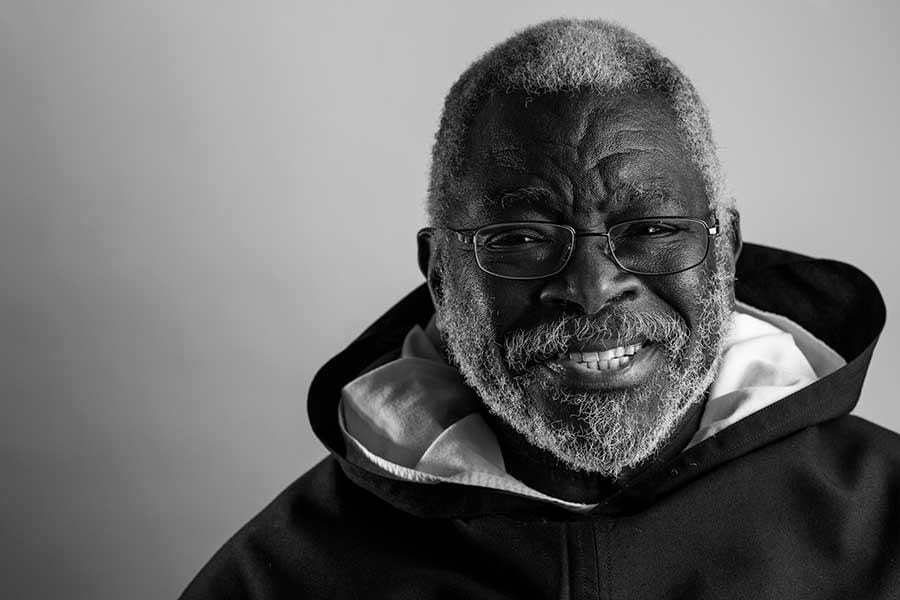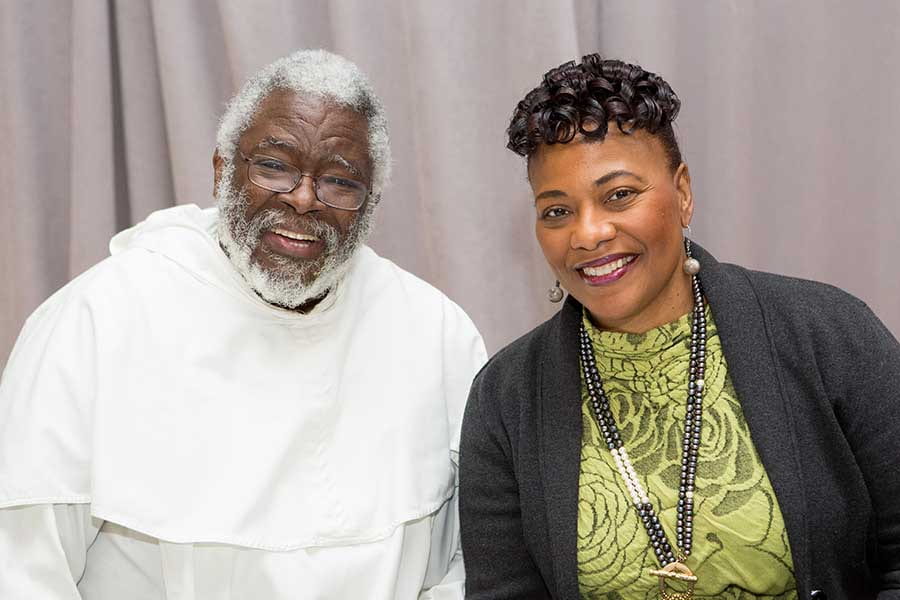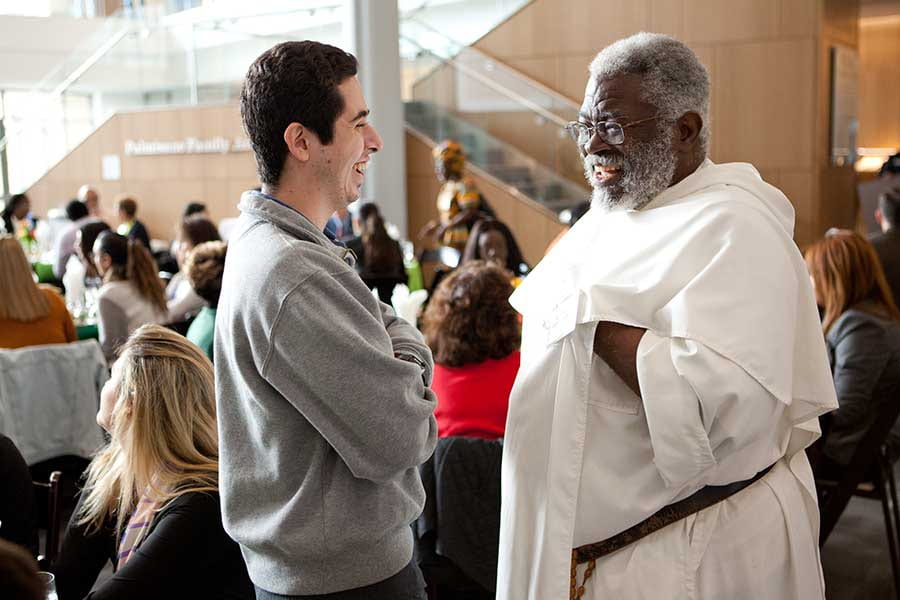On Race and the Church: A Conversation with Rev. Peter Batts, O.P.

By Michael Hagan ’15, ’19G
Rev. Peter Batts, O.P., beloved assistant professor of theology, shared what Rev. Dr. Martin Luther King Jr.’s example means to him as a priest in an Instagram post from Campus Ministry. I sat down with him to discuss his experiences growing up under segregation, his priestly ministry, and the Black Catholic experience.
Hagan: Growing up in southern Virginia in the 1950s and 60s, when did you first become aware of segregation?
Father Batts: I was aware of it from the time I was a little child. In my town of Norfolk, Virginia, everything was segregated. If you got on a bus, you went to the back of the bus. You couldn’t go to the snack bars in the downtown stores — the kinds where people could sit and get a milkshake or something — you could not do those things. Everything was segregated. Everything. You just accepted that that was the way it was.
Hagan: As a young Roman Catholic in the Upper South, how segregated or integrated was your church community?
Father Batts: Pretty segregated. There were two different churches. At the church that I went to, the priests and sisters were white, but the parishioners were all Black. That church merged with another, predominately white church, but it quickly became segregated as the white people claimed that they had to leave for one reason or another. So we became a Black parish pretty much the same as the parish before.
Hagan: You recall watching Dr. King’s 1963 “I Have A Dream” speech on television. And you described the March on Washington as one of the most hopeful events in American history. What was it like watching that speech and that march in real time?
Father Batts: As I remember it, I was in the ninth grade or close to it. It was so hopeful. You realized that this whole system was probably going to come to an end. There was this call for change coming not just from the Black community, but also from a good portion of the white community, coming from the church, etc. It was this very, very hopeful, optimistic time, and Dr. King was very energizing.
Hagan: In your church community, were there white parishioners who really took Dr. King’s message to heart, or were they entirely married to the segregated order?
Father Batts: Most of the white people I met through church were priests and sisters, and the church was not, for the most part, a Southern church. The order of priests that ran our parish, the Josephites, were specifically founded to minister to Black people. They tended to be from the North, from Canada, from Ireland. The sisters were the same way. Most were northerners uncomfortable with segregation to begin with. I did not have a lot of contact with the local Southern white population.
Hagan: When did you decide to become a priest?
Father Batts: I wanted to be a priest ever since I was a little kid in second or third grade. It was always there. I didn’t encounter Dominicans until years later. We had no Dominicans in my area, so all I really knew were these Josephites. There was a Black missionary priest who would come home to visit his family every so often. I would serve Mass for him, so the idea of a Black priest wasn’t strange. There were also one or two nuns from our parish — Black nuns — who would come visit their families. I read a lot, so I knew that in the Church in general, there were all kinds of Black priests, Black religious, African bishops. I knew that what I was seeing in the South was a kind of aberration. I was confident that Black people, even under segregation, could accomplish whatever they set out to. The doctors and other professionals I saw, because of segregation, were Black. I saw many examples of Black people doing well-educated kinds of jobs.
Hagan: In the Instagram post that prompted this interview, you mention that Dr. King quoted Thomas Aquinas in his famous Letter from a Birmingham Jail. How did Dr. King employ Aquinas, and what do Thomas’ teachings offer those fighting for justice?
Father Batts: He employed Thomas and Augustine in talking about unjust laws and what makes a law just or unjust. He uses Thomas basically to say that you do not have to obey unjust laws. He is trying to show that there is a long history in the church of commitment to justice, and that which is not just does not have to be obeyed.
Hagan: How has Dr. King’s example influenced your ministry as a priest, and who are some of your other inspirations?
Father Batts: Priesthood is about serving people, and Dr. King’s example taught me that. It’s about not just getting people to heaven, but it’s about trying to have a more just social order here. It’s about being committed to peace. It’s about being committed to life issues, and life issues are not just opposition to abortion, but also to capital punishment, for instance. It’s a justice thing, really. There are all kinds of other models that I had as a kid. Bobby Kennedy was one of my models. Thomas Merton, do you know much about him?
Hagan: A little bit, yes. I read some of his essays my senior year.
Father Batts: He was a big influence on me beginning in high school. He was a Trappist monk who wrote a lot about peace. The earlier Thomas Merton tended to be basically spiritual, but as he got older and as Vatican II came, he ventured out and talked a lot about war, peace, and racism. There was this whole movement coming out of the Second Vatican Council for the Church to become concerned about the social order and to commit itself to justice and the cause of the poor. It’s hard to describe growing up in the 1960s if you weren’t there. It was an incredibly idealistic moment in American history. It’s almost the exact opposite of what we have now. It was in the air. You had the beginning of the Peace Corps, and people, young people especially, wanted to change the world. And if you were a Catholic, you not only had certain things in the society leading you towards this, but if you were a Catholic who took this seriously, you had the Second Vatican Council endorsing this.

Hagan: I’m glad that you mentioned the Second Vatican Council because that actually leads directly into my next question. As the Civil Rights Movement was transforming American society, the Church was undergoing what Pope St. John XXIII described as “aggiornamento.” One professor of mine described it as opening windows to let in light and air. So what impact did the spirit and teachings of the Second Vatican Council have on American Catholics and other Christians in their fight for justice?
Father Batts: Before the Council, priests and nuns running parishes, schools, and hospitals would often cop out by saying something like “we think there should be integrated facilities, but we have to obey state law, and we have to respect the customs of the South.” After the Council, the Church was more committed to being involved in the change. For example, a number of priests and nuns went down to march with Dr. King in Selma. The official Church seemed very supportive in many ways of the civil rights struggle. There were bishops who sometimes at a cost to themselves integrated churches and schools when white Catholics didn’t want it. There is one amazing picture of hundreds of Sisters of Charity of New York in habits marching for civil rights through Harlem. It’s hard to imagine nowadays, when it seems like we only protest abortion. It is hard to imagine that kind of thing happening today, but that was the time in which we were living.
Hagan: You mentioned in your Instagram post that Pope Paul VI echoed Dr. King’s anti-war position speaking in New York and that, after speaking, he insisted on driving through Harlem to show solidarity with Black Americans. How were this speech and that action received both by Black and white Catholics in the United States?
Father Batts: I think certainly by Black Catholics they were well received. The pope even went to Africa around 1967 and thanked the Africans for the gift of Blackness to the church. It was an amazing statement from the pope, but that was it. There were Catholics who were not accepting of this. When Dr. King took his fight up north to the Chicago area, he met a lot of resistance as vicious as anything you’d see in the South. Many of these opponents were Catholic people from Catholic ethnic groups. One person threw a rock that I think might have hit Dr. King. There was a sister marching with Dr. King and she said, “This is what we forgot to teach them. We forgot to teach them about loving all people.” So for many Catholics, the message didn’t so much get through. It got through to priests and nuns to a great extent, especially sisters, but with a lot of ordinary people, it really didn’t get through.
Hagan: I’m intrigued by the phrase “the gift of Blackness.” Say a little more about it.
Father Batts: Well, what the pope was exposed to — what was probably new to him too when he went to Africa — was a vibrant African Church, a Church that was growing. Many priests, many nuns. He saw that the Africans were Africanizing the liturgy. They were introducing their own dances and rituals and colorful clothing and that sort of thing into the liturgy. So, in that sense he was thanking them for their Blackness — that they were bringing their African, Black culture into the Church and the Church was receiving it.
Hagan: In 2018, the U.S. Conference of Catholic Bishops issued its first pastoral letter on race in nearly 40 years. Could you say a little bit about this document, Open Wide Our Hearts: The Enduring Call to Love?
Father Batts: I must confess, I don’t think the bishops have much credibility anymore. The documents 40-50 years ago had much more credibility than today’s. One expected at that time that the bishops would take action. We really haven’t seen a lot of action. What you almost see in the Catholic Church in recent decades is a kind of withdrawal from involvement in the Black community and causes of justice. Schools, the commitment to the schools — you don’t have the sisters there anymore, they just aren’t there. You don’t really seem to hear a lot from the Catholic Church about Black ministry. There are pockets, but they’re limited. I am very anti-abortion, but many of the same people who protest abortion show no interest in injustices faced by Black people, will show no attempt to welcome Black Catholics to their churches, etc. Now, when the bishops speak, there is a tendency to see their statements as probably the Black bishops trying to get this commitment, but for the most part the words get lost. It is not that what they are saying is not true, but that the Church is not putting the kind of effort behind them that it needs to.
Hagan: What can the bishops do to reestablish lost credibility?
Father Batts: I think they’ve got to put money into the Black community. Certainly, the school system, if they were to give themselves totally to it, could still do an excellent job in terms of helping Black people. I think we could make our churches more welcoming to Black people because I think we are not gaining a lot of Black Catholics anymore. I think if there is no Black church in an area, Black Catholics just tend to leave the church or don’t practice because they do not feel welcomed at predominantly white churches. That doesn’t mean they’re going to be turned away at the door. It doesn’t mean that. But it means people are going ignore them and that they aren’t going to be invited to join organizations or get involved in the Church, which I think bothers a lot of Black Catholics. It’s a problem with the Catholic Church in general. Most Catholic churches are not real communities. At most churches, you could go your whole life and sit in the back and nobody would ever say a word to you. Well, Black people are especially not comfortable with that.
Hagan: How do the experiences of Blackness and Catholicism intersect?
Father Batts: As a child I was a Black American Roman Catholic, so they always fit together in a way that they don’t fit for a lot of people. And I know enough about the history of the Church to know that it is not just a white institution. It didn’t start as a white institution. Blackness has been there from the beginning, but many people both white and Black see Catholicism as something that is kind of alien to Black people. I remember when I was in college in Baltimore, and I would go to Mass and various things, and people would say to me, “Oh, I’ve never met a Black Catholic before.” And I thought that was strange because growing up, all the people around me were Black Catholics. And increasingly in the Northeast, I would find people thought that I was odd, and the oddness came not just from Black people or from white people; both would ask, “Why are you a Catholic? Blacks aren’t Catholic.” You’ve got both sides kind of not understanding what you’re all about, and I think that is difficult for a lot of Black Catholics.
And that’s why I mentioned the need for that supportive community to let you know you’re not alone. People who don’t have that tend to drift away. Take the Dominicans. In our province, there are two Black Dominicans, and both of us are older men. There’s no middle age Black Dominicans, there’s no younger ones, and there is — from what I have seen over the years — no desire to do anything about that. So what’s going to happen if any Black person is interested in the Order? They are going to come and they’re not going to see any Black people their age. They’re not going to feel that they are especially welcome or needed because we don’t have Black ministries. In earlier decades, even in our province, there was a great interest in certain quarters in ministry to Black people. That’s gone now.

Hagan: Franciscan friar and theologian Daniel Horan is similarly critical of Open Wide Our Hearts, writing that while it does some good, it falls short in failing to name racism as a white problem for which white people have responsibility. It mentions sin 14 times and racism more than 50, but it never uses words like “privilege”or “supremacy,” and its references to whiteness are mostly historical. He writes, “The truth is that racism is a white problem because in this society, whites hold the power, establish the institutions, and set the social norms.” In general, do the bishops go too far out of their way to avoid naming problems for what they are? Do white Catholics have uncomfortable truths that we need to confront?
Father Batts: You do. There’s a Black priest, Father Bryan Massingale — an ethicist. He has talked a lot about this too, that racism is a white problem. The Catholic Church doesn’t want to deal with it. It doesn’t want to make white Catholics uncomfortable, so it keeps quiet about it. When it speaks, it speaks in great generalities. If you speak too specifically — I know this from preaching — people get very uncomfortable. If you talk about loving everybody, that’s OK, and treating everybody justly, that’s fine, but if you mention race or Black people specifically, people get very nervous. Even on the Martin Luther King holiday, if you talk about Dr. King in very general terms, oh that’s nice, but if you talk about it in terms of what are we doing to change our parish to make our parish more receptive to Black people for the Black people here, then people get very, very nervous. “What’s he doing? He’s stirring up things.” People don’t want to feel uncomfortable, and the Church doesn’t want to make people feel uncomfortable. Bishops don’t want to feel uncomfortable, so nothing gets done.
As a Catholic institution, I think Providence College can do a lot to make people more aware. I think the College has been working toward this under the leadership of Father Sicard and Father Shanley. But there is always a lot more that we can do, especially at the student level. We need to ensure that our students have an understanding of Catholicism that includes justice and anti-racism. For too many people, Catholicism is about obeying rules and not about love.
Hagan: What would you hope students gain from their theological education at Providence College relevant to what we’ve been discussing?
Father Batts: As a teacher I’m probably not the best, myself, in doing this sometimes, but there are often opportunities to talk about racial justice. I talk about liberation theology. I talk about the role of women, what women theologians are doing. You have to give a wider understanding of the Church than simply a medieval emphasis on Thomas himself. Theologians today are talking about justice, they are talking about liberation, they are talking about things that are political because the Gospel is political, so you’ve got to do that sort of thing. Theology courses are more interesting to students when we do.





